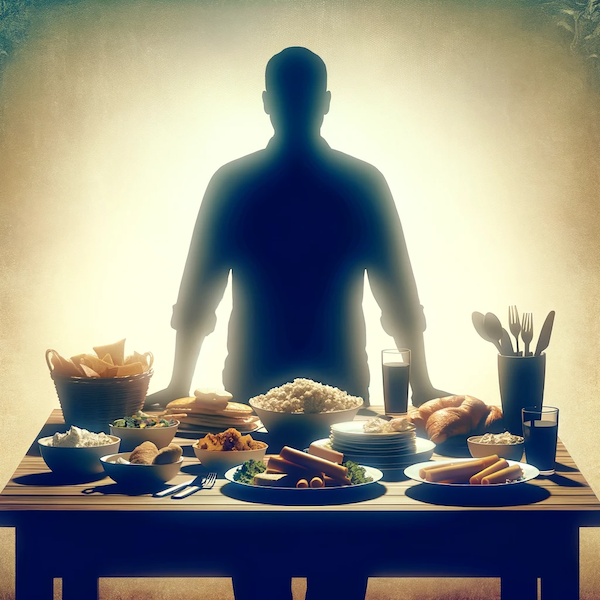The term “binge eating disorder” is often associated with bulimia. Overeating, though, is not necessarily connected with a binge-and-purge situation. Binge eating disorder is its own medical condition – a serious one – and it is heavily tied to trauma, stress, and major depressive disorder.
What Is Binge Eating Disorder?
There is a complex relationship between binge eating disorder and trauma, and emotional distress often leads to this condition. Though food cravings are normal for everyone, and everyone has experienced a time of overindulging on food during a major holiday or party, someone with a binge eating disorder (BED) frequently consumes large amounts of food in a single sitting and feels like they just can’t stop eating. They’re out of control – and they know it. Stopping, however, isn’t easy to do alone.
Symptoms of Binge Eating Disorder (BED)
BED is an acknowledged medical condition that comes with clear signs that help with diagnosis. Someone who overeats to the point of having the disorder may:
- Eat until they’re uncomfortably full
- Eat in secret
- Eat quickly when binging
- Eat even if they aren’t hungry
It’s not just physical acts or feelings that qualify as a symptom. After or during a binge, the person with BED can feel guilt, shame, disgust, or depression about their behavior. It’s these emotional reactions, along with behavior, that contribute to the accurate diagnosis of BED. Being overweight is not always an indicator of the condition as someone with binge eating disorder can be of average weight too, but obesity is common which further complicates the condition both physically and mentally.
The Connection Between BED and Trauma
Eating disorders can affect anyone, no matter their race, gender, or other demographic factors, but as with many illnesses, some people are predisposed to the condition and have greater risk factors for developing binge eating disorder.
Genetics, trauma, stress, and environment all have the potential to trigger an eating disorder. Even people with ADHD are more prone to BED because of impulse control issues and the need for stimulation.
Someone with BED is far more likely to have a dual diagnosis, like depression. During a depressive episode, the urge to binge eat can be triggered. Whether a person is diagnosed with binge eating disorder depends on how frequently they binge, what they binge, and the feelings they experience when binging. There are degrees of BED, from mild to severe. For some people, it’s a temporary occurrence or periodic, for others it is a daily constant.
Differences Between Binge Eating Disorder and Bulimia
It’s important to get the correct diagnosis before proceeding with any treatment for BED or otherwise. If there are any doubts about whether a condition could be considered BED or bulimia, know that bulimia is a physical and mental health condition with its own unique characteristics. The binge is always accompanied with an undoing of the behavior, such as:
- Self-induced vomiting
- Taking laxatives
- Exercising excessively
- Restricted diet
- Fasting
Another significant difference between BED and bulimia is that a person with bulimia is overly focused on the shape, size, and appearance of their body while someone with binge eating disorder is more likely to feel bad about themselves when it comes to their skills, abilities, and achievements. Compensatory behaviors are not common in BED. This condition is about a loss of control.
Diagnosis and Treatment for BED
Though it is not well-known or discussed as often as bulimia or anorexia, binge eating disorder is the most common eating disorder in the United States, with nearly 3 million people diagnosed. It was officially recognized as a formal diagnosis in 2013.
A mental health assessment is necessary for an accurate diagnosis of BED and any other psychological disorders. A firm determination of binge eating disorder is difficult, particularly because hallmarks of the condition are embarrassment and remorse and patients are less likely to own up to certain behaviors. It’s important for any clinician to meticulously gather a thorough history of a person’s habits, emotional wellness, and behaviors to properly determine what’s happening.
Substance abuse disorders, as well as anxiety and mood disorders, are a common symptom of binge eating disorder — but it’s easy to overlook or fail to recognize BED, which means the condition often goes untreated.
Holistic Therapy for Binge Eating Disorder
The holistic therapies available in holistic rehab are designed to help people learn to cope and live with a dual diagnosis, whether they’re dealing with BED and depression, BED and anxiety, or BED and substance abuse.
The treatment of stressors, substance abuse, and mental health happen simultaneously at Beachside Rehab in West Palm Beach, Florida. Contact our holistic rehab center to learn about our facility’s inpatient and outpatient rehab, mental health treatment, holistic recovery, and luxury retreat. Call today at 866-349-1770 to speak with a trained admissions counselor.

